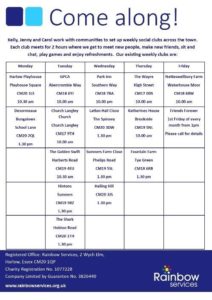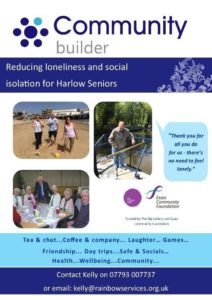The big takeaways
- Social isolation and loneliness are terms often used interchangeably. They are similar, but it’s useful to understand them as distinct concepts.
- Recruiting the right volunteers and supporting them effectively has been crucial in making the clubs a success.
Who is involved?
- Volunteers
- Older people
- Local charities and organisations
What is it?
Rainbow Services is a registered charity, established in 1999. We work to alleviate the effects of disadvantage, deprivation, and social exclusion in Harlow and surrounding areas through projects that support, enable and develop people and organisations, and stimulate beneficial change in the local community.
In September 2013 we began to deliver community-led activities and to facilitate connections and conversations between local people, organisations and existing projects. We used the principles of Asset Based Community Development to support communities to work towards change.
The project
In the Netteswell ward of Harlow older people talked about wanting to get to know their neighbours and make new friends. And so we developed Community-Builder – a Harlow-wide programme, which received funding from the Big Lottery Reaching Communities Fund.
What was the goal?
Community Builder in Harlow aims to reduce social isolation and loneliness for Harlow seniors by providing weekly social clubs in local communities. It is directed by them.
The process
We met people in their communities, asking them if and how they would like to reconnect with others. We sourced diverse community venues which were accessible to and embedded in the local area and which could be used for other activities, such as theatres, cafes, pubs and sports clubs.
We secured our first venue in partnership with Harlow Council and started a social club there, running for 2 hours each week. Having recruited local volunteers to take over its running, we moved on to set up another weekly club.
Rainbow Services acts as the catalyst, but volunteers keep the clubs going. There was, and continues to be, no financial outlay, so the clubs continue to be sustainable. Each is different, designed around its members’ needs. In some, members sit and chat, in others they play games such as bingo, hoy, balloon tennis, or take part in quizzes. The common thread is that they all get together every week to socialise.
Over the last five years this social movement has grown and we now have seventeen weekly social clubs.
“…everybody seems in the same frame of mind, they just want a chat and [to] be happy. I think sometimes people just want to talk you know, they don’t want to do… some clubs do quizzes and all that sort of thing, but I think here they just want to talk, which is good…” (Fountain Farm club participant)
The Participants
Our clubs are for anyone who consider themselves a Harlow Senior. The original focus was on those aged over 65, but we have members in their 50s and up to their 90s.
People are signposted through various routes, including social prescribing, Social Services, Community Agents. Some have picked up a leaflet from their local shop, GP surgery, pharmacy or hairdresser.
Our publicity material promotes ‘Reducing loneliness & social isolation in Harlow Seniors’.
“But these clubs, if there are others like me it keeps them going, it keeps me going… Unless you’re lonely you don’t know what loneliness is.” (The Wayre club participant)
 Social isolation and loneliness are terms often used interchangeably, however whilst they are similar, we understand them as distinct concepts.
Social isolation and loneliness are terms often used interchangeably, however whilst they are similar, we understand them as distinct concepts.
Loneliness is a subjective feeling about the gap between a person’s desired and actual level of social contact. It refers to the perceived quality of the person’s relationships. Loneliness is never desired and lessening these feelings can take a long time.
In contrast, social isolation is an objective measure of the number of contacts that people have. It is about the quantity and not quality of relationships. People may choose to have a small number of contacts.
Evaluation
In 2018 we commissioned HWE Insights Ltd to provide an independent evaluation of our project. HWE Insights Ltd is an arms-length subsidiary of Healthwatch Essex, wholly owned by the charity Healthwatch Essex. It was set up to undertake high quality research, engagement, communication and training activities on a commissioned basis.
The qualitative element to the evaluation was crucial in helping us understand the difference the project has made to the people who attend. The evaluator observed clubs and interviewed participants and volunteers. Monitoring forms designed by Rainbow Services helped to demonstrate changes numerically whilst the attendance data showed a broader picture.
Outcomes
The findings suggested that the clubs provide a safe and accessible place where members can socialise and meet new people. They are seen as inclusive, informal, and friendly; they are responsive to the differing needs of individual members. A sense of place and belonging is created, which members report extends beyond the two hours of the weekly meeting. The clubs also offer opportunities to seek out and exchange information and advice.
Recruiting the right volunteers and supporting them effectively has been crucial in making the clubs a success. Volunteers typically experience a sense of reciprocal exchange as a result of taking part. Rainbow Services’ reputation and relationships with local organisations have been important, as have the skills, personalities and passion of its staff.
Next steps
We think this simple concept could be replicated anywhere and used with any age group. Our work with many partners, from the local theatre and hotel to pubs and community centres, make the clubs accessible to everyone. We are now extending this project across West Essex.
